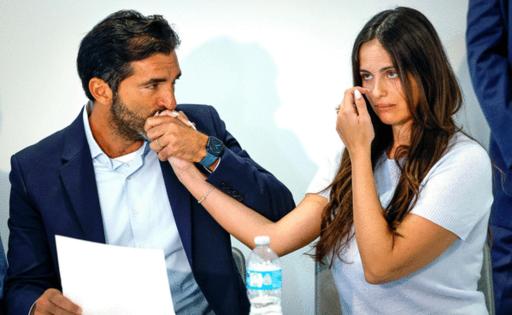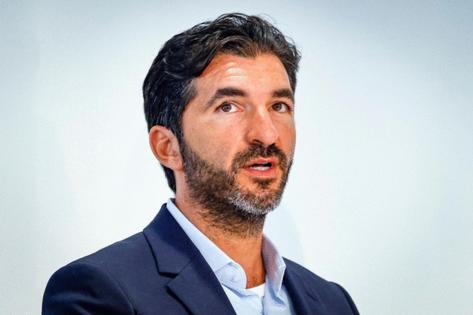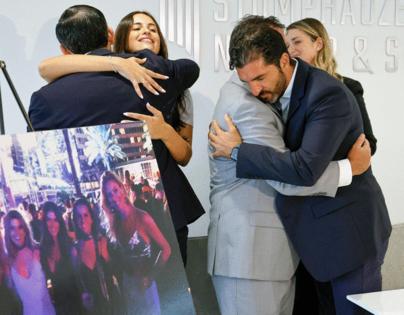Alexander brothers' friend cleared in sex case -- tearful, angry at state prosecutors
Published in News & Features
MIAMI — As Ohad Fisherman sat clasping his newlywed’s hand in a law office with a stunning bay view high above downtown Miami just a day after his rape charge was dismissed, one thing was abundantly clear: His defense team believes the state charged Fisherman and the Alexander twins for a sex crime that it made little effort to prove.
“The point of this case is that it was an 89-minute investigation for an eight-year old case,” Fisherman defense attorney Nora Lewis said of the time Miami Beach detectives took to interview the accuser and three potential witnesses. “He could have gone to prison for 30 years.”
Fisherman, 39, was charged in December with pinning down a woman as Oren and Alon Alexander took turns raping her in a luxurious Miami Beach hi-rise on New Year’s Eve in 2016. He was facing a single count of sexual battery with multiple perpetrators, which could have landed him in prison for up to 30 years.
Miami-Dade State Attorney Katherine Fernandez Rundle vowed Monday to move forward with the prosecution of the 38-year-old twin Alexander brothers in the same case — even with the likelihood of trial being remote. Oren has been charged with rape in two other Miami Beach cases and the twins and their year older brother Tal Alexander are currently in a Brooklyn federal detention center awaiting trial on federal sex trafficking and rape charges.
During a Tuesday press conference at Jeffrey Sloman’s Miami office, defense attorneys finally said out loud what’s been whispered behind closed doors for months: The state never should have charged the trio in a case that has been tainted by a lack of access to evidence since the start — and that Fernandez Rundle simply got involved in for the headlines.
“The state was just interested in piling on the Alexander brothers,” said Sloman, Fisherman’s lead counsel.
“This is a publicity stunt,” said Oren’s counsel Eddie O’Donnell IV. “They never thought they would have had to execute. They’ve always known they couldn’t win the case.”
In a prepared statement Monday announcing the close-out of Fisherman’s case, Fernandez Rundle said she wouldn’t discuss the case any further because criminal counts against the twins remained pending.
“Our decision today is only as to Ohad Fisherman. The cases against Oren and Alon Alexander remain pending and nothing involving the disposition of this case affects the cases against the Alexander brothers,” she said Monday.
Given the opportunity to respond again Tuesday, a state attorney spokesman declined.
The charge against Fisherman was dropped, the state attorney said, mainly because prosecutors could not disprove that Fisherman was aboard a boat in the Intracoastal Waterway in Miami around the same time his accuser said she was raped. The state based its decision on a picture Fisherman claimed to have posted to Facebook at 9 p.m. on New Year’s Eve 2016, the same evening the woman said she was raped.
Defense attorneys pegged the fuzzy picture — which doesn’t clearly show Fisherman even when it’s blown up — as being taken at about 5:46 p.m., which was sunset the evening of the incident. Receipts from Uber rides the accuser took to and from Alon’s lavish Collins Avenue condo show she arrived at 6:13 p.m. and left at 7:26 p.m. The picture, according to Fisherman, was taken from a drone owned by one of the Alexander brothers.
Feds unwilling to share potential critical evidence
State prosecutors knew about the photo for months but only recently passed along to defense attorneys as part of pre-trial discovery. Both sides have also been stymied by federal prosecutors unwilling to share electronics seized from the defendants when they were arrested and their homes were raided in December. Both sides say the information could bolster their cases.
Prosecutors with the U.S. Attorney’s Office for the Southern District of New York won’t even admit if metadata in the electronics exist as they prepare for the federal cases against Alon, Oren and Tal Alexander.
But none of that mattered to Fisherman Tuesday, his voice cracking several times as he read through a carefully prepared statement.
“What happened to me is a lesson of what can happen to anyone when the system breaks down,” he said. “This [the charge] is not dismissed on a technicality. This is no compromise.”
Fisherman had to cut his Japanese honeymoon short to return to South Florida and turn himself in to law enforcement after he was named an indictment that led to the arrests of the Alexander brothers. They were taken into custody during early morning Dec. 11 raids at their Miami Beach homes in a joint operation between Miami Beach Police and federal agents.
Prosecutors say the Alexander brothers used their fame and wealth to lure women to their Miami Beach and New York apartments and on trips, even out of the country. They say the women were often drugged before they were raped. Separately, dozens of women — including the accuser in the 2016 Miami Beach case — have filed civil lawsuits against the brothers claiming sexual assault.
Fisherman case not likely to change Alexander status
Monday’s dismissal of the charge against Fisherman probably doesn’t mean all that much to the Alexander brothers pending cases in South Florida or for their upcoming January federal trial New York. The likelihood of the twins standing trial for any of the three local rape cases has been remote since they were escorted to New York under federal watch in early January.
If they are released to stand trial for any of the three cases in South Florida, it would be after an acquittal in New York or after they’ve served prison time for any conviction in the federal case.
As for potential key evidence that could help convict or exonerate the brothers in the South Florida cases, it continues to be under the control of federal prosecutors who aren’t willing to share it.
That’s been a sore subject for both sides since state court hearings on the 2016 case began months ago. The defense has pressed the state for metadata from cellphones, computers, even drones that federal agents confiscated during the December Miami Beach raids. Miami-Dade Circuit Court Judge Lody Jean has ordered the state to turn over the evidence.
And lead state prosecutor Natalie Snyder has said not only has she not been given the opportunity to view the potential evidence, federal prosecutors have refused her attempts to get the information.
Remarkably, the New York federal prosecutors are unwilling to pass along evidence not only because investigations into the state and federal cases were separate — they would be forced to if it were a joint operation — but because of Florida’s liberal public records law, which allows media to get court records.
In a letter dated March 13, acting U.S. Attorney for the Southern District of New York Martin Podolsky denied Snyder’s request for federal search warrants, arrest affidavits and data from seized electronic devices taken during the arrests of the Alexander brothers. Podolsky said there was not a “joint investigation” and that the only coordination between the FBI and Miami Beach Police or Miami-Dade prosecutors was limited to the execution of the arrests and search warrants on Dec. 11.
A joint investigation is a legal term that enables all participants equal access to any information or evidence seized during an operation.
Podolsky went on to say that Florida’s public records laws would be in direct contradiction of the laws of New York state.
“In any event, even if we were inclined to provide the requested items, we understand that if shared with your office, these items will become public records under Florida law. Such disclosure would therefore violate the protective order issued by the Honorable Valerie E. Caproni in our federal case in the Southern District of New York,” Podolsky said. “Moreover, the disclosure would compromise the privacy and safety of victims and witnesses and the confidentiality of ongoing investigations.”
©2025 Miami Herald. Visit at miamiherald.com. Distributed by Tribune Content Agency, LLC.












Comments